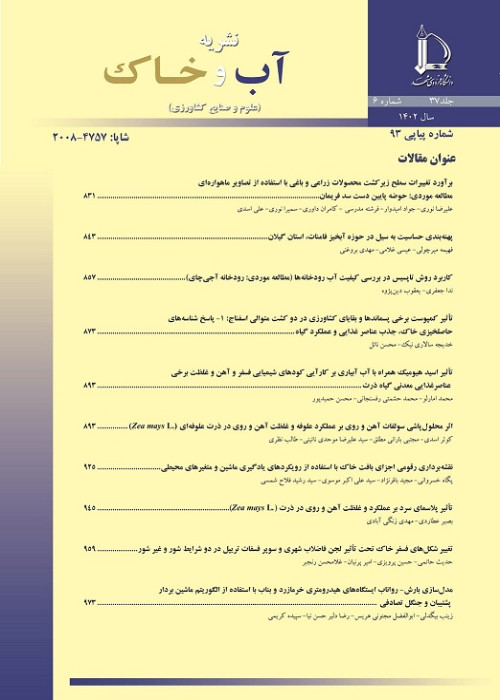Common Water Resources Conflict Analysis due to Agriculture Land Development Using Game Theory and GMCR+ (Case Study: Nazlouchay Basin in Urmia Lake Watershed)
Land-use changes and development of irrigated agricultural lands are very important factors that affect natural resources such as the quantity and quality of water resources and the environment. Land use change is attributed to two major processes. The first process is the change in land cover, which is related to the expansion or limitation of the area of land used (such as pasture, agricultural or urban land). The second process is a change in land cover management type (for example, changes in irrigation, fertilizer use, crop type, harvesting methods or surface impermeability). Recently the Urmia lake has been accompanied by a reduction in water resources and the continuation of this process can completely cause to dry Urmia Lake. One of the approvals of the Iranian government after the formation of the National Working Group for the Lake Urmia restoration program was to prevent the development of agricultural lands in this watershed since 2014. Unfortunately, no serious and effective action has been taken in this case yet, and this process has progressed to cause conflicts in this region. Game theory is one of the most important methods used in modeling and analyzing water and environmental resources conflicts.
In the present study, using GMCR + software, the water resources conflicts arising from agricultural land development has been analyzed. In this conflict, by accurately identifying the set of decision-makers and their strategies in the conflict process (Regional Water Company, Agriculture Organization, Justice, and Profiteering Farmers), the model was executed with 4 players, 6 options, and 64 states. Players' performance was assessed once as ideal behavior (importance to the environment, sustainable development, and preference of long-term over short-term interests) and then as the use of completing a questionnaire. Then 4 states in the ideal behavior as equilibrium states and 7 states in the condition of using the questionnaire results were extracted as equilibrium states. The conflict was also examined in the coalition state of 3 government organizations (Regional Water Company, Agriculture Organization, and Justice Organization). Finally, the most probable states of equilibrium in the game results were identified.
In the discussion concerning equilibrium points, it is crucial to consider that for resolving the dispute and the proposed solution, we need to examine not only the stability of these points but also the state's priority from the perspective of stakeholders. Based on the discussions and the output results of the conflict model using the GMCR+ model, the optimal response and conflict resolution can be found in scenario 12. This scenario holds a high priority for three key players: the Agricultural Organization, the Regional Water Company, and the Justice Department. However, it doesn't share the same level of priority with the Profiteering Farmers. The reason for this divergence lies in the preference for personal gain and profit pursuit over the broader interests of the entire catchment area.
In recent years, despite the imposed restrictions, the Urmia Lake Basin has witnessed a notable increase in the cultivation of water-intensive crops. This shift has transformed arid lands into irrigated ones and altered agricultural areas into residential zones. According to the principles of the tax evasion game, when land development carries no moral or financial consequences for profit-driven farmers, and they are aware that regulatory institutions will not commit excessive resources to prevent and effectively combat the expansion of illegal farmlands, Profiteering Farmers will consistently engage in unauthorized development under any conflict scenario. In light of the revenue potential of this situation and the opportunity to enhance one's social standing, Profiteering Farmers will persist in unauthorized development regardless of the prevailing conflict circumstances. The findings underscore the critical role of the Regional Water Company and the Agricultural Organization. These entities must proactively employ their legal capacities to impede and deter the expansion of agricultural lands. Additionally, the Justice Organization assumes primary responsibility as a crime prevention factor, while its secondary role as a judicial enforcer within this conflict situation appears fitting. Therefore, all situations are stable for Profiteering Farmers. It seems that creating a platform and conditions in which Profiteering Farmers do not develop agricultural land themselves or do not develop land due to the protection of government institutions, can be very thoughtful and effective.
- حق عضویت دریافتی صرف حمایت از نشریات عضو و نگهداری، تکمیل و توسعه مگیران میشود.
- پرداخت حق اشتراک و دانلود مقالات اجازه بازنشر آن در سایر رسانههای چاپی و دیجیتال را به کاربر نمیدهد.


